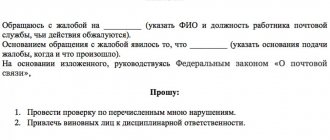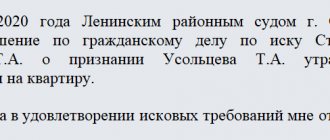Home / Complaints, courts, consumer rights
Back
Published: 10/12/2018
Reading time: 7 min
0
470
Conflicts in teams arise quite often. Subordinates can express their dissatisfaction with the current situation in the form of a collective appeal to management or another authorized body. A collective complaint means a written statement on behalf of the entire staff of the organization or a certain part of it, in which they reflect existing violations on the part of management, and also put forward a number of demands.
- Rules and features of drawing up a collective complaint Application form
- Where is it served?
The reasons for employees to file a complaint may be a violation of their labor rights, as well as the emergence of interpersonal conflicts. Violation of labor rights usually consists of the following:
- Violation of the terms of payment of wages or unlawful change in its size, in accordance with Art. 142, art. 236 of the Labor Code of the Russian Federation (LC RF);
- employer's refusal to formalize labor relations , wrongful dismissal or non-compliance with working conditions (Article 234 of the Labor Code of the Russian Federation);
- violation of labor protection requirements in the workplace;
- failure by the employer to comply with the conditions specified in the employment contract or local regulations.
Internal conflicts between subordinates and management also negatively affect the overall performance of the organization. In most cases, such situations do not require intervention from senior management, but sometimes the conflict cannot be resolved without taking additional measures. The grounds for writing a collective complaint may include:
- deliberate sabotage by superiors;
- obscene behavior on the part of the manager , affecting the honor and dignity of other employees;
- rudeness and insult to subordinates , including physical force.
All of the above actions by management can serve as grounds for filing a written complaint by one employee, as well as by the entire team.
Filing a complaint: description of grounds
The current norms of the Labor Code describe the provisions that can be used when drawing up complaints. According to the law, each member of the team has rights that cannot be violated. The same applies to leaders.
Violation of labor rights refers to direct violations of the current law. This means there is a reason to complain about a person who behaves inappropriately.
Collective complaints against bosses are filed for the following reasons:
- Unlawful dismissal due to violations that did not occur.
- Refusal to pay for additional overtime work, new responsibilities.
- Refusal to promote a citizen, although there are grounds for this.
- Refusal to pay for sick leave provided.
- Overtime work, about which there were no agreements.
- Refusal to provide vacation days.
- Refusal from official employment.
- Lack of required cash payments and bonuses.
It is worth carefully studying the Labor Code before filing a complaint against your manager. Only then do they draw up the petition itself, excluding the possibility of dismissal due to slander.
Managers may violate labor and civil rights. Such actions include:
- harassment;
- use of brute physical force;
- pressure, voicing threats;
- profanity;
- rude and boorish behavior.
On these grounds, ordinary class complaints and statements of claim are filed for trial. Additionally, a demand is made to compensate for moral damage in a certain amount.
Janitors read out a complaint against the despot director in this video:
When can you complain about management?
Violation by the head of the internal order of the organization and the provisions of labor legislation, as well as regular failure to fulfill the duties assigned to him, is unacceptable.
The most common violations include:
- informal communication with employees;
- public insult of an employee;
- forced to work beyond the norm without adequate payment for hours worked;
- violation of labor safety rules (for example, failure to provide an employee with protective equipment required by regulations);
- coercion to perform work not provided for in the labor contract concluded with the citizen;
- violation of orders from higher management;
- refusal to provide well-deserved leave;
- deliberately disrupting a project or designated plan;
- deduction of wages of working personnel.
In practice, the rights of employees are violated by the heads of territorial divisions, however, any citizen can face non-compliance with labor legislation - both those employed in a large company and those working for a private entrepreneur.
Where can I complain?
The main thing is to correctly indicate the addressee. Typically, this function is performed by a control body, the head of an enterprise, or the head of a specific department. Only if the recipient is correctly identified will the complaint be promptly considered, and the process itself will not raise questions.
There are the following authorities that have the right to accept documents:
- senior management;
- court;
- Labour Inspectorate;
- prosecutor's office
How to complain about your boss to senior management?
The complaint can be sent to the head of the company through the secretary. It is necessary to prepare two copies of the application, one of which is submitted to an official of the organization for consideration, and the second remains with the applicant after marking the date of receipt of the document.
You can file a complaint against your boss using the sample presented on the website, or contact a lawyer for this purpose. It is worth noting that preparing the document yourself is not so difficult, and the services of a specialist are paid.
If senior management refuses to take measures to resolve the conflict, employees should contact government authorities.
Standard design rules
Complaints can be individual or collective. The last variety gives the maximum effect. Then the sender becomes all members of the team who were dissatisfied with the boss’s action. Or, several employees whose rights and interests were directly violated are appointed as the main compilers.
The standard form of the document contains the following information:
- Company name, in full form.
- Full name of the manager on whose part the violation was committed.
- The position of the employee, with an exact indication of the full name.
- Reasons for drawing up the document. What rights are violated and how?
- Description of the essence of the problem.
- Date when the violation was committed.
- A requirement regarding what action must be taken by management.
- Date of the application.
- Applicant's signature.
The paper may be accompanied by additional documentary evidence. If necessary, it is permissible to refer to the testimony of witnesses.
How to write a complaint correctly, see here:
Trade union organization
According to Art. 370 of the Labor Code of the Russian Federation, a trade union organization represented by a labor inspector or a labor protection commissioner has the right to:
- monitoring compliance with labor laws on the part of the employer (boss);
- conducting an examination of working conditions and safety;
- participation in the investigation of the causes of an occupational disease or emergency at the workplace;
- protecting the rights of its members to receive compensation for harm caused to health at work;
- submitting an official proposal to management to eliminate the violation;
- participation in the process of considering a labor dispute;
- appealing to the authorized state bodies to appeal against the actions (inaction) of the manager, etc.
To receive appropriate assistance, the employee must submit an application to the trade union, in writing or orally, and, if possible, provide indisputable evidence of his innocence to the elected body.
Only its registered member has the right to contact a trade union organization.
Useful tips
Experts give several recommendations that will help make the document as effective as possible:
- It is better to communicate with the other participants in advance. It's good if you can come to a common opinion.
- Before drawing up collective complaints, contact details of all parties are recorded separately. Then, if necessary, it will be easy to contact to discuss what is happening.
- Collective drafting of a complaint is literally ineffective. It is worth entrusting this procedure to one person. The main thing is to objectively reflect all the circumstances and facts that matter. The remaining participants simply study the document and, if necessary, put their signatures or make appropriate adjustments.
- The text must contain plural personal pronouns.
- The less emotions the better. It is advisable to present only facts and references to legislative standards confirming what has been said.
- The requirements are put forward in the final part.
- The signature sheet of all participants is a required attachment.
The legislative framework
The complaint process is fully regulated by a specific list of documents:
- Labor Code of the Russian Federation from 3.12.01
- Federal Law No. 294
- Government Order No. 476
- Federal Law No. 59
However, the government can make appropriate changes that may affect (add or subtract) the content of the legislative framework.
Regarding the rejection of a complaint to the labor inspectorate
There are several reasons why a higher authority refuses to consider incoming requests:
- Not all personal information is provided.
- The manager's data is incorrect or incomplete.
- Point of view is only subjective. The document was drawn up on emotions, and there are no compelling arguments in favor of the compiler. And there are no documents confirming existing violations on the part of the manager.
- A large number of errors, the presence of profanity.
- The complaint does not reach the addressee. In this case, it is recommended to send the documents again, adding the appropriate notes.
How to contact the labor inspectorate if your employer has violated your rights? See here:
What else should you consider when compiling?
Documents can be submitted anonymously. Then you should indicate in advance that information about the compilers is not disclosed. This is especially important when it comes to issues that are important to the operation of the entire enterprise.
Applications are sent in the form of a registered letter, then the senders will know exactly when the document was received by the other party.
Such complaints are reviewed within a month. During this time, the inspectorate must organize a thorough inspection of the enterprise. It is recommended to save the receipts that were issued when sending letters. After a month and a half, the sender receives a response from the labor inspectorate.
The labor inspectorate usually checks the following components of an enterprise's activities:
- the fact that employees are familiar with all documents related to the organization of work;
- personal accounts of subordinates along with wage statements;
- orders from management;
- local acts with employee data, rules on remuneration for labor, internal daily routine;
- pay sheets;
- time sheet;
- vacation schedule;
- staffing schedule;
- personal cards of subordinates;
- reporting on the movement of work books;
- contracts.
No statute provides that an employee can waive his complaint and the related review. The procedure is still mandatory, since it helps to identify administrative offenses.
In any case, the employee can say that the conflict situation has been resolved. This mitigates the punishment of managers, even if serious violations are discovered.
The statement withdrawing the complaint is written in the same form as the complaint itself. First, personal information is indicated for each of the parties. Then there is a description of the essence of the issue. The last elements are the date and paintings.
Features of such a document
In cases where the top management of the organization is the owner (and this is in almost all cases when we are not talking about a government organization or service), the complaint is initially written to him.
Accordingly, it will be considered by one of the leaders of the organization or persons responsible for such operations. Who exactly depends on the hierarchy in the company itself and how high the position the employee occupies, how high the boss is, how many layers of management are “above him”.
One way or another, when considering an application, the person doing this can also rely on his own subjective opinion. In other words, whether an employee’s requests will be satisfied depends only on his decision and it is unknown what will motivate it.
But in some cases this decision can be influenced. As mentioned above, management is always interested in profit. Write the text of the complaint against the boss in such a way that it suggests the conclusion that if you change the boss, the benefits will increase. For example, if the manager puts moral pressure on employees.
If you can explain that this has a detrimental effect on the efficiency of work relative to the time spent, then you will increase the chances of a successful outcome of the case. Or if the boss does not motivate employees financially, does not encourage their aspirations and does not reward them for their merits when he has the opportunity.
In theory, this knowledge is not so important, but not in practice. Unfortunately, in our realities we often encounter situations where such relationships develop between a manager and a superior person that everything is forgiven to the former. But presenting facts about the loss of benefits due to the actions of the boss or the threat of litigation will make the manager think - is his relationship with your boss worth these losses?
When it comes to a state structure, you don’t have to think much in this way - the benefit goes to the state, and not to the body that accepts such statements. However, the decision then must be made more objectively - in many cases it is possible to conduct commissions and similar investigations to prove the guilt of the manager.
State inspectorates inspect budgetary organizations with particular care.
It is worth filing a complaint against a manager to a higher organization after making an informed decision and having really good reasons for doing so. One must, one way or another, be prepared for the fact that they will consider, but the requests will not be satisfied, and the consequences of this. Roughly speaking, you need to be prepared for the situation to get even worse and for the pressure from management to increase. But this is not a reason not to defend your rights.
What answer can the labor inspectorate give?
There may be several options for responding to an appeal to the labor inspectorate:
- Bringing the manager to criminal liability, if there are grounds.
- Temporary cessation of the enterprise's activities until the violations are eliminated.
- Removal of a manager from office, on a temporary or permanent basis.
- Bringing to administrative liability, usually in the form of a fine. Its specific size depends on the severity of the violation.
- An instruction that identified problems should be corrected. The labor inspectorate rarely gives more than 1 month to complete the relevant actions. If no action is taken during this time, more serious measures are taken.
- On-site inspection for the purpose of inspection.
Communication with the prosecutor's office
This authority also considers violations of the personal and labor rights of citizens.
Here are just some of the reasons when appeals are made directly to the prosecutor’s office:
- delay of vacations or salaries;
- insults;
- sexual harassment;
- assault.
After the prosecutor's office accepts the appeal, an official inspection is carried out for the organization. If violations are identified, the manager will be obliged to correct them. The responsible officials are subject to appropriate liability.
The reason for contacting, for example, may be an attempt to hide important information. This usually concerns accidents.
For information on the technique of writing a complaint to law enforcement agencies, see here:
Terms for consideration of the application
A complaint received by a state body, local government body or official must be considered within 30 days from the date of its receipt (Clause 1 of Article 12 of the Law of 02.05.2006 No. 59-FZ). The period is counted from the moment of registration of the written request. In some cases, the period for consideration of a complaint may be extended to 30 days, of which the applicant must be notified.
If a complaint from employees is sent to senior management, then the text indicates the desired period for consideration of the complaint. As a rule, in such cases the standard period is 10 days.
The response to the complaint must contain not only the solution to the problem, but also the deadlines for fulfilling the specified requirements. If the requirements specified in the appeal are denied to the applicants, then such a response must be legally justified.








